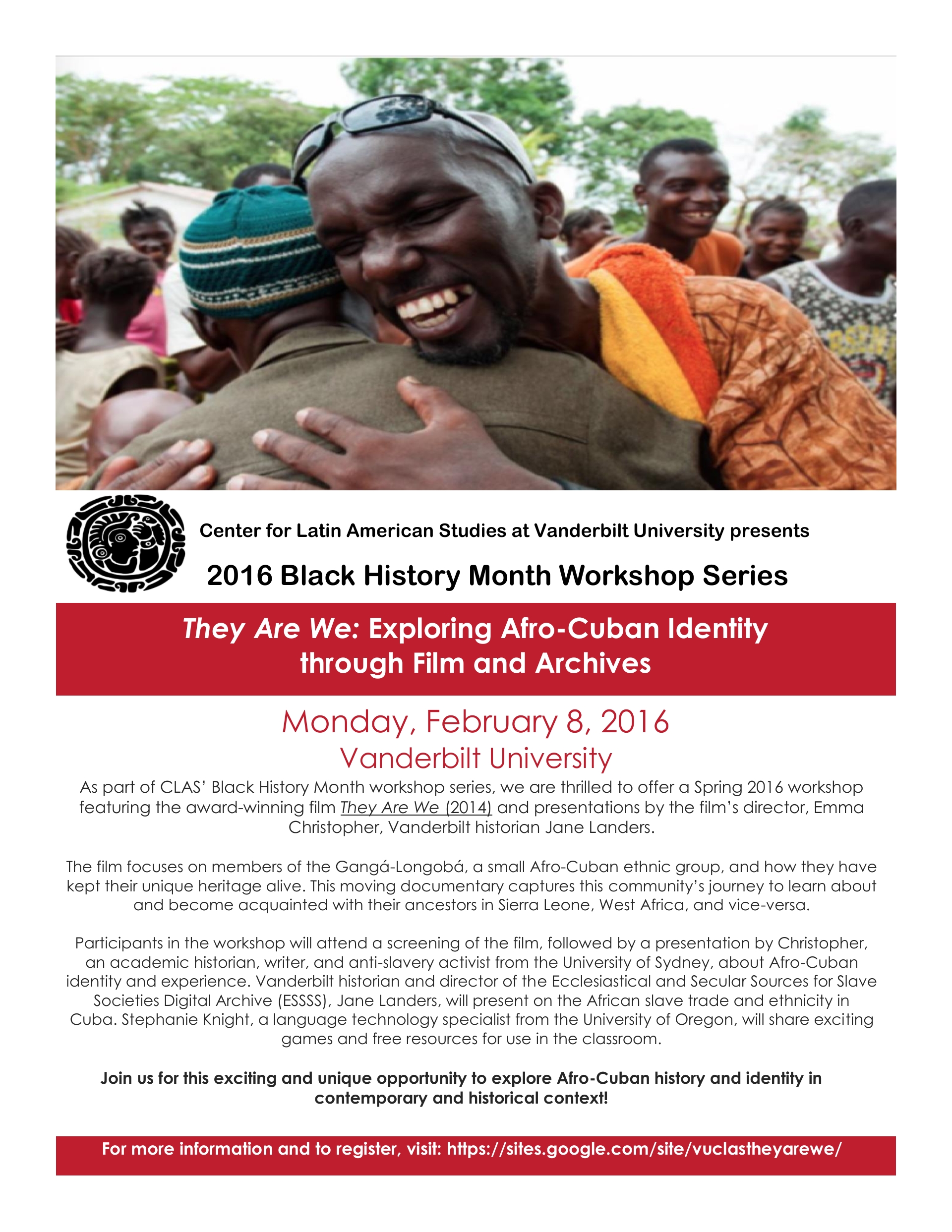Professional Development: They Are We: Exploring Afro-Cuban Identity through Film and Archives
In December I applied to a black history teacher workshop offered by Vanderbilt University titled, They Are We: Exploring Afro-Cuban Identity through Film and Archives. I was attracted to this program because it told the story of west African slavery and the connection modern-day Cubans can make directly to their ancestry.
Basically, while completing her doctoral work, Emma Christopher stumbled up a story that took her all over west Africa. She knew words to a song sung in religious ceremonies amongst Afro-Cubans and was looking to trace it. Through her work, she was able to discover the story of a little girl who was illegally enslaved towards the end of slavery and wound up in Cuba. She taught her cultural songs to her children and they still sing them today. It was a movie of a reunion of sorts, generations of Afro-Cuban descendents were able to trace their history and ancestry back to Africa.
After watching the deeply emotional but relevant film with the same title together as a group, I was able to ask the director, Emma Christopher, about her methodology, filming, etc. of the film. After our discussion, I was inspired to further my education in film studies.
One detail that stuck out in my head was the fact that it was not her intention in the beginning to make this film. It's just where her journey lead her. She talked about how long the editing process was and the fact that she still has more film to edit. YouTube has a clip of her film and it is worth a look.
Next, historian Jane Landers at Vanderbilt University presented her work on the Transatlantic slave trade in Cuba and the Caribbean. For over twenty years she has traveled around Latin America to document the lives of Africans brought to Latin America. Her work is remarkable. She was able to trace families through court documentation. She has shared her work as the Ecclesiastical and Secular Sources for Slave Societies Digital Archive ESSS. It's worth a look.
The last presentation was on free resources in the classroom.
This workshop made my cheap list because the registration for this program was only $10 and Vanderbilt gave me a scholarship that included a hotel stay and reimbursement for transportation. Vanderbilt has always been generous and I would recommend any educator interested in Latin American Studies to check out Vanderbilt's yearly Latin American offerings.
Basically, while completing her doctoral work, Emma Christopher stumbled up a story that took her all over west Africa. She knew words to a song sung in religious ceremonies amongst Afro-Cubans and was looking to trace it. Through her work, she was able to discover the story of a little girl who was illegally enslaved towards the end of slavery and wound up in Cuba. She taught her cultural songs to her children and they still sing them today. It was a movie of a reunion of sorts, generations of Afro-Cuban descendents were able to trace their history and ancestry back to Africa.
After watching the deeply emotional but relevant film with the same title together as a group, I was able to ask the director, Emma Christopher, about her methodology, filming, etc. of the film. After our discussion, I was inspired to further my education in film studies.
One detail that stuck out in my head was the fact that it was not her intention in the beginning to make this film. It's just where her journey lead her. She talked about how long the editing process was and the fact that she still has more film to edit. YouTube has a clip of her film and it is worth a look.
Next, historian Jane Landers at Vanderbilt University presented her work on the Transatlantic slave trade in Cuba and the Caribbean. For over twenty years she has traveled around Latin America to document the lives of Africans brought to Latin America. Her work is remarkable. She was able to trace families through court documentation. She has shared her work as the Ecclesiastical and Secular Sources for Slave Societies Digital Archive ESSS. It's worth a look.
The last presentation was on free resources in the classroom.
This workshop made my cheap list because the registration for this program was only $10 and Vanderbilt gave me a scholarship that included a hotel stay and reimbursement for transportation. Vanderbilt has always been generous and I would recommend any educator interested in Latin American Studies to check out Vanderbilt's yearly Latin American offerings.

Comments
Post a Comment